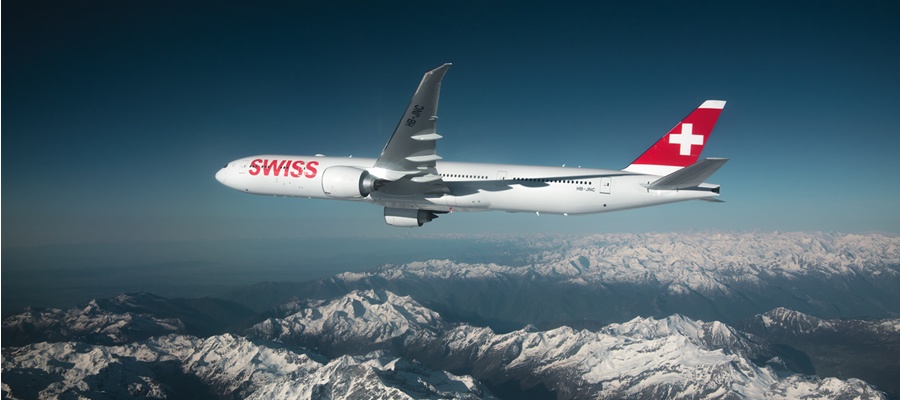Swiss International Air Lines (SWISS) achieved adjusted earnings before interest and taxes (Adjusted EBIT) of CHF 636 million for 2018, a 16% improvement on the prior-year result of CHF 548 million and the highest operating profit ever recorded in the company’s history to date, reported the airline. SWISS credits investments in an efficient aircraft fleet – SWISS put two further Boeing 777-300ERs and 13 more C Series aircraft into service in the course of the year – and the premium SWISS product, healthy economic conditions, successful fuel hedges and various non-recurring items, for the strong performance. Through a combination of additional capacity and higher seat load factors, total revenues for the year amounted to CHF 5.30 billion, a seven percent increase on the prior-year volume of CHF 4.95 billion.
SWISS transported just under 18 million passengers in 2018.
All areas of the company, including its cargo business and its Geneva operations, made sizeable contributions to the favourable earnings result. “I am very proud of our entire SWISS team,” says CEO Thomas Klühr. “And I am delighted that we have posted the highest operating profit in our company’s history, and have achieved an EBIT margin of more than eight per cent for the fourth year in succession.”
“Our billions in investments are reaping their rewards,” adds Chief Financial Officer Michael Niggemann. “And the fact that we are able to sustainably make such investments, and that our earnings strength enables us to derive our share of our industry’s continued growth, is thanks also to our rigorous cost discipline and our cost efficiency.”
Total revenues for the fourth quarter of 2018 were up three percent on the prior-year period at CHF 1.28 billion (2017: CHF 1.24 billion). Adjusted EBIT for the fourth-quarter period declined by 20 per cent from the CHF 109.21 million1) of 2017 to CHF 87.28 million1), owing in particular to higher fuel costs.
SWISS says that it will continue to benefit from its advanced and fuel-efficient aircraft fleet in 2019. The positive impact here will be felt even more strongly from summer onwards, once all thirty C Series aircraft are delivered and in service. At the same time, however, costs are expected to increase as a result of the preparations for the arrival of two further Boeing 777-300ERs and the first Airbus A320neo aircraft, along with a decline in the benefits from fuel hedging arrangements. SWISS nevertheless seeks to achieve a double-digit Adjusted EBIT margin for the year.
In February 2018, SWISS transported 1,157,740 passengers in February, a 1.2% increase on the same month last year. A total of 10,408 flights were operated during the period, 4.0% more than in February 2018.
Systemwide passenger capacity for February was raised 1.2% from its prior-year level in available seat-kilometre (ASK) terms. Total traffic volume for the month, measured in revenue passenger-kilometres (RPK), was 2.5% up on the prior-year period. Systemwide seat load factor improved accordingly, rising 1.0 percentage points to 77.1%.
Meanwhile, SWISS plans introduce new Premium Economy Class on its long-haul aircraft fleet from Spring 2021. The new product will initially be available on the company’s Boeing 777-300ERs, with each aircraft offering 24 Premium Economy seats. In the medium term, the new product should be extended to the entire SWISS
long-haul fleet.
SWISS states that the decision to introduce the new class of travel was in response to a growing demand for the product, which has been demonstrated with similar products at Lufthansa and Austrian Airlines, SWISS’s sister companies within the Lufthansa Group.
SWISS will embark on the cabin conversion work required in winter 2020/21, and the new Premium Economy Class product will be available from spring 2021. SWISS will be investing a total of some CHF 40 million in installing the new seating class on its Boeing 777 fleet.

